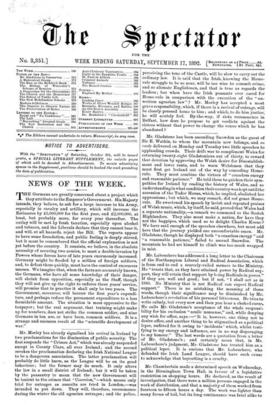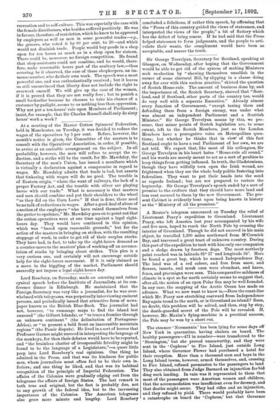Mr. Chamberlain made a determined speech on Wednesday, in the
Birmingham Town Hall, in favour of a legislative restriction on shopping hours. He declared, as the result of investigation, that there were a million persons engaged in the work of distribution, and that a majority of them worked from fourteen to fifteen hours a day. The work was lighter than many forms of toil, but its long continuance was fatal alike to recreation and to self-culture. This was especially the case with the female distributors, who besides suffered positively. He was in favour, therefore, of restriction, which he knew to be approved by employers as well as men in some powerful trades—e.g., the grocers, who voted it by 80 per cent. to 20—and which would not diminish trade. People would buy goods in a shop open for ten hours as much as in a shop open for sixteen. There could be, moreover, no foreign competition. He found that shop-assistants could not combine, and he would, there- fore, make reasonable hours part of the sanitary law,—thus covering, be it observed, the case of those shopkeepers, an im- mense number, who do their own work. The speech was a most powerful one, and was enthusiastically received ; but it leaves us still unconvinced that liberty does not include the right to overwork oneself. We will give up the case of the women, if it is proved that they are not really free ; but to punish a small bookseller because he chooses to take his chance of a customer by gaslight, seems to us nothing less than oppression. Why not put a ten-hours' rule upon Members of Parliament; insist, for example, that Sir Charles Russell shall only do sixty hours' work a week P



































 Previous page
Previous page